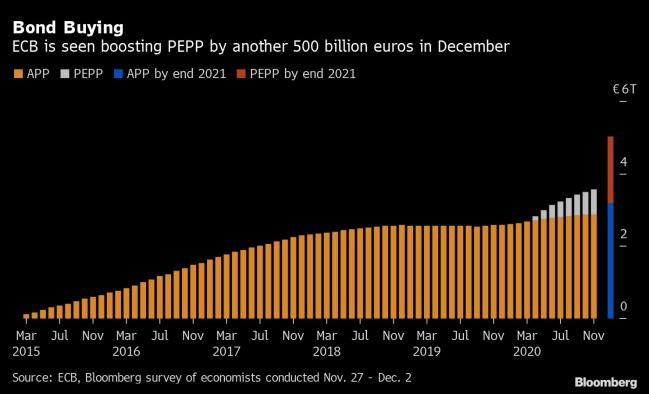ECB Seen Extending and Boosting Stimulus to Battle Longer Crisis

(Bloomberg) — The European Central Bank will extend two key stimulus programs through the end of next year to support the economy until vaccines are widely enough available to entrench the recovery, according to economists surveyed by Bloomberg.
Respondents predict policy makers will add six months and 500 billion euros ($608 billion) to their 1.35 trillion-euro emergency bond-buying program when they meet virtually on Dec. 10. The Governing Council is also expected to offer new long-term loans to banks, and lengthen the period in which they get extra incentives for keeping credit flowing to companies and households.
With a spike in infections forcing governments to impose new curbs on economic activity, the ECB has pre-committed to more action. Officials including President Christine Lagarde have highlighted the Pandemic Emergency Purchase Program and targeted long-term loans to banks, so-called TLTROs, as the institution’s main tools during the crisis.
None of the 33 economists surveyed predicts a cut in interest rates next week.
While recent progress on vaccines against Covid-19 makes it likely that the pandemic can soon be contained, the economic fallout such as high debt and greater unemployment will likely be around longer. Other risks remain, such as the European Union’s struggle to agree terms on its 1.8 trillion-euro joint spending package, and a failure to reach a trade deal with the U.K. before a Dec. 31 deadline.
“The end of the health crisis, which now appears likely in the course of 2021, does not mean the end of the economic crisis,” said Philippe Gudin, chief European economist at Barclays (LON:BARC) Plc. “The ECB is likely to communicate its willingness to ensure that the path toward a full recovery will continue to be facilitated by very supportive liquidity and financial conditions.”
On top of more bond purchases — estimates ranged from 250 billion euros to 650 billion euros — economists also expect the ECB to offer banks even more generous access to its long-term loans. Exceptional terms that give lenders a financial incentive to extend credit to the real economy are seen being prolonged by six months until the end of 2021.
Additionally, most of those surveyed anticipate another round of long-term loans to be offered quarterly at even better terms. An extension of the maturity — currently three years — is the most likely option.
What Bloomberg Economics Says
“With banks’ profitability lowered by provisioning for loan losses and compressed margins, and responses to lending surveys flagging risks of tightening credit conditions in the coming quarters, we expect the ECB to use TLTRO to ensure the continued transmission of looser monetary policy in lending to firms.”
–Maeva Cousin, David Powell and Jamie Rush. Read the ECB PREVIEW
“The ECB will adjust its most important policy levers, PEPP and TLTROs, to assure markets that asset purchases remain unchanged through next year,” said SEB strategist Lauri Halikka. “A new series of TLTROs will secure favorable funding conditions for banks.”
Ulrike Kastens, an economist at DWS Investment GmbH, argued that “the ECB has the clear intention to provide as benign financial conditions as possible to support the recovery.”
Crucial for the ECB’s decision next week will be updated economic forecasts highlighting the short-term impact of the latest wave of the pandemic, as well as the recovery path through the next three years.
Economists predict this year’s downturn will be less severe than initially forecast because of a strong third-quarter rebound, resulting in weaker growth next year. Inflation is seen climbing to an average of 1.5% in 2023, still significantly short of the ECB’s goal of “below, but close to, 2%.”
With uncertainty high and concrete plans for the roll-out of coronavirus jabs yet to be made, looks too far into the future might be more foggy than usual.
“Lagarde will focus on the near-term pain from new lockdowns in calibrating her message, downplaying the otherwise obvious good news on the vaccine front,” said Claus Vistesen, chief euro-area economist at Pantheon Macroeconomics.
©2020 Bloomberg L.P.

